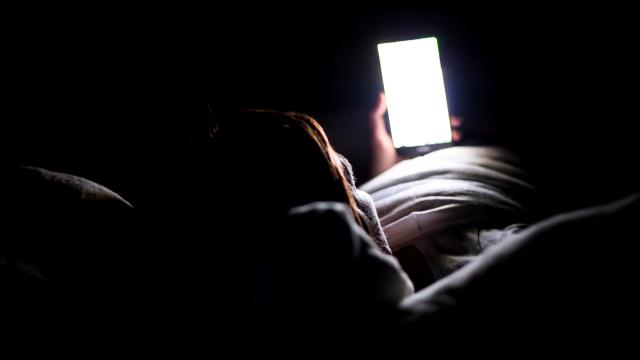People who only occasionally fall down an internet rabbit hole on their smartphones late at night might be able to rest easier – at least according to the results of a new study in mice. Researchers found that short bursts of light exposure at night won’t necessarily disrupt your internal clock, including sleep habits.
The researchers used mice to study the circadian rhythm. In both mice and humans, the circadian rhythm is primarily controlled by the brain’s suprachiasmatic nucleus (SCN), a tiny region found in the hypothalamus. One crucial aspect of the SCN involves regulating our sleep/wake, or light/dark, cycle. It’s long been thought that any kind of light exposure our eyes take in affects the SCN, and thus, can affect our sleep.
“Light information comes into the SCN, and that’s what synchronizes all of the body’s clocks to the light/dark cycle,” said lead author Tiffany Schmidt, a neurogeneticist at Northwestern, in a release from the university. “This one master pacemaker makes sure everything is in sync.”
Schmidt and her team wanted to test this long-held theory that the SCN responds to any light exposure. So they bred mice that had light-sensitive nerve cells in the retina that were only capable of communicating with the SCN. Then they exposed these mice to light for short periods of time.
Because mice, unlike people, are nocturnal, the light should have made them want to fall asleep. But they instead just carried out on with their day, sleeping and waking as normal. Their body temperature, which fluctuates predictably before, during and after sleep, also followed the same pattern seen in mice with normal circadian rhythms.
What this could mean, according to the authors, is that our brains respond to acute light—meaning brief exposures to light — through a different neural pathway than what’s used for long periods of light exposure, a pathway that doesn’t involve the SCN.
“If these two effects — acute and long-term light exposure — were driven through the same pathway, then every minor light exposure would run the risk of completely shifting our body’s circadian rhythms,” Schmidt said.
The findings will be published this week in the journal eLife.
Mice and their brains aren’t a perfect proxy for people, obviously. And even if the same general principle does apply to us, Schmidt and her team say there’s no clear lead on where these other pathways could exist in the brain. And there’s undoubtedly a point where being exposed to light late at night too long or too often can start to affect our internal clock—even if where that point lies is still a mystery right now. There needs to be a lot much research studying these questions and others.
What is clear, the authors cautioned, is that chronic nighttime light exposure, and the disruptions to our sleep it can cause, can be very bad for health. In other words, don’t use this study as an excuse to start regularly binge-watching Netflix till 4am. “Light at the wrong time of day is now recognised as a carcinogen,” Schmidt said. “We want people to feel alert while they are exposed to light without getting the health risks that are associated with shifted circadian rhythms, such as diabetes, depression and even cancer.”
